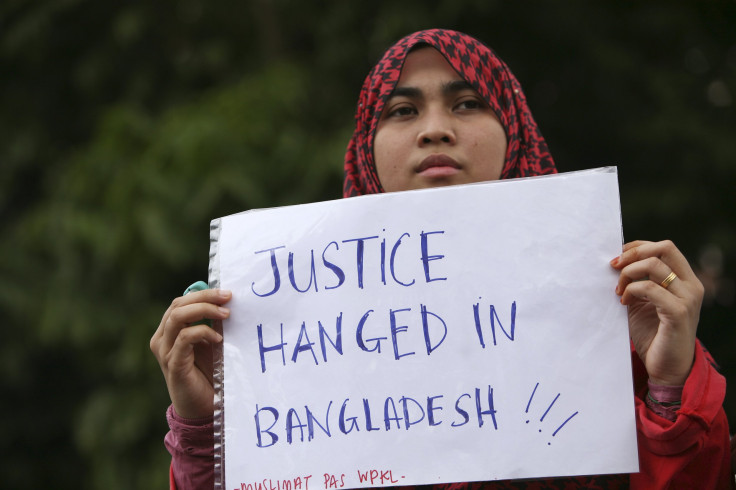Bangladesh Islamist Leader Mohammad Kamaruzzaman Executed; Supporters Call For Nationwide Strike

A senior Islamist party official in Bangladesh was hanged Saturday after being convicted of committing crimes against humanity during the country's 1971 independence war against Pakistan. The execution of Mohammad Kamaruzzaman sparked calls for a nationwide strike by his supporters, the Associated Press reported.
A senior prison official confirmed the execution outside the central jail in Dhaka, the Bangladeshi capital. A second official, speaking on the condition of anonymity, told the AP that 62-year-old Kamaruzzaman was killed by hanging. International human rights officials urged Bangladesh not to proceed with the execution, saying the man's trial did not meet "fair international standards."
Bangladeshi authorities heightened security in Dhaka and elsewhere ahead of the execution. The country suffered a deadly wave of political violence in 2013 after another Jamaat-e-Islami leader convicted of war crimes was executed.
Kamaruzzaman was an assistant secretary-general of the country's largest Islamist political party. Prosecutors say he headed a militia group that collaborated with the Pakistani army in central Bangladesh during the nine-month battle in 1971, and that he orchestrated the killings of at least 120 unarmed farmers.
Bangladeshi authorities say as many as 3 million people were killed during the country's struggle for independence from Pakistan, though Pakistani investigators have put the figure at around 26,000 civilian casualties. An estimated 200,000 women were raped and about 10 million people forced to flee to neighboring India that year.
The Jamaat-e-Islami party denounced Kamaruzzaman's killing and urged the country to strike in protest, the AP said. At the same time, Bangladeshis who supported the trial and execution held celebratory rallies in Dhaka and other cities.
"We are happy that justice has been delivered finally," Mohammad Al Masum, a student at Dhaka University, told the AP as he joined a procession in Shabagh Square.
Kamaruzzaman was given a death sentence by a special tribunal in May 2013. On Monday, Bangladesh's Supreme Court rejected his final legal attempt to appeal the conviction. Kamaruzzaman could have sought a presidential pardon, but he refused to seek clemency.
Ravina Shamdasani, the U.N. high commissioner for human rights, based in Geneva, and the United States both pressed Bangladesh not to carry out the death sentence.
Kamaruzzaman is the second man to be executed since tribunals were established in Bangladesh nearly five years ago to try suspected war criminals. Bangladeshi officials killed Abdul Quader Mollah in December 2013 for charges of war crimes including torture, abduction, murder and mass killing at a site that later came to be known as the “Village of Widows," Agence France-Presse reported this week.
© Copyright IBTimes 2025. All rights reserved.





















